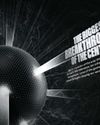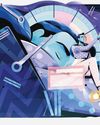
As the partner of a 40-something male, I'm acutely aware of the hair-loss horizon looming large in our house. With the first signs of a receding hairline come furtive glances in the bathroom mirror, then throwaway remarks about shaving it all off. Pretty soon, we'll be stocking up on scalp cream and hats.
Going bald is no joke, though, as the now-retired American body-image expert, Prof Thomas Cash, showed in a 2001 study. Cash convinced 145 customers of Virginian barber shops and hair salons to visit his lab, where he checked the extent of each man's hair loss and asked them how they felt about it. Men who had more severe balding were less satisfied with their hair, but also with their overall appearance, admitting to feeling self-conscious and unattractive, while actively coping by restyling their hair, trying to dress better and embracing the aforementioned hats.
And while Cash's study focused on men's hair hang-ups, plenty of women have to confront hair loss too. In fact, according to Dr Christina Weng, a dermatologist in Boston, Massachusetts, and chief medical officer at Los Angeles based company Pelage, which is developing a new drug to treat the condition, the majority of patients she sees for hair loss are women. "Hair is obviously a big part of identity so it's really distressing and the treatments are very limited for female patients," she says. In contrast to men, who lose their hair in the classic pattern we've come to expect (the receding hairline and bald spot) women are more likely to have thinning across the whole scalp.
This story is from the October 2024 edition of BBC Science Focus.
Start your 7-day Magzter GOLD free trial to access thousands of curated premium stories, and 9,000+ magazines and newspapers.
Already a subscriber ? Sign In
This story is from the October 2024 edition of BBC Science Focus.
Start your 7-day Magzter GOLD free trial to access thousands of curated premium stories, and 9,000+ magazines and newspapers.
Already a subscriber? Sign In

THE WORST IDEAS OF THE 21ST CENTURY
NOT ALL IDEAS CAN BE HITS. ALONGSIDE GROUND-BREAKING INNOVATIONS, 21ST-CENTURY SCIENTISTS HAVE HELMED THEIR SHARE OF WILD TECH FLOPS, DUBIOUS THEORIES AND OVERHYPED BREAKTHROUGHS. HERE ARE THE BIGGEST TO FORGET

10 IDEAS THAT WILL SHAPE YOUR NEXT 25 YEARS
Predicting the future is considered a fool's game. But it's one many of us like to play.

THE BIGGEST BREAKTHROUGHS OF THE CENTURY
We're a quarter of the way into the new century. To mark this milestone, we asked the UK's top minds to highlight some of the game-changing scientific breakthroughs shaping our world since the year 2000

DO THE SCIENCE COGNITIVE SHUFFLE
Trouble sleeping? A lot on your mind? Use this trick and sedate your synapses

WHAT DETERMINES HOW MANY ABS I CAN GET?
Assuming you're a human being, you have exactly the same number of abs as everybody else: two.

HOW CAN I IDENTIFY MY PSYCHOLOGICAL BLIND SPOT?
In the 1950s two American psychologists, Joseph Luft and Harrington Ingham, proposed a way of thinking about psychological blind spots - things you don't know about yourself - that they called the 'Johari Window' (the term is a combination of their first names).

How can I change my personality?
Want to become more confident, extroverted or assertive? Science shows that with a few simple changes, you can unlock your best self

Could your cosmetics be harming your health?
Cosmetic companies are phasing out microplastics and so-called 'forever chemicals' to help protect consumers.

extraterrestrial US Congress is talking about activity again. Is the truth really out there?
Despite several testimonies, the question remains frustratingly unanswered

Map of 100 million human body cells revealed
Over three dozen new studies mark significant milestone towards complete Human Cell Atlas